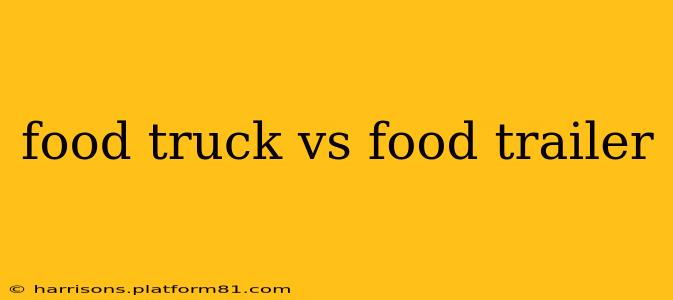The tantalizing aroma of freshly prepared food, the vibrant energy of a bustling crowd – owning a mobile food business is a dream for many aspiring entrepreneurs. But the first hurdle? Choosing between a food truck and a food trailer. Both offer the portability and flexibility of a mobile kitchen, but they differ significantly in several key aspects. This comprehensive guide will help you decide which option best suits your culinary vision and business goals.
What are the Key Differences Between Food Trucks and Food Trailers?
The most obvious difference is mobility and maneuverability. Food trucks, being built on a chassis designed for driving, are generally easier to maneuver in tight spaces and navigate through traffic. Food trailers, however, require a towing vehicle, limiting their maneuverability and requiring additional licensing and insurance considerations.
What are the Advantages of a Food Truck?
- Maneuverability and Accessibility: Food trucks can easily reach various locations, catering to different events and customer bases without needing a separate towing vehicle. This allows for greater flexibility in choosing locations with high foot traffic.
- Brand Recognition: A well-designed food truck often serves as a rolling billboard, increasing brand visibility and creating a stronger brand identity. Their unique designs can be highly memorable.
- Built-in Transportation: No need for a separate towing vehicle, saving on fuel costs and simplifying logistics.
What are the Advantages of a Food Trailer?
- Customization and Space: Food trailers usually offer more customizable space and can be designed to accommodate larger kitchens and equipment, potentially leading to a wider menu and higher output.
- Cost-Effectiveness (Potentially): Depending on the build and features, food trailers can sometimes be less expensive to purchase upfront compared to fully equipped food trucks. However, this difference often diminishes when factoring in the cost of a separate towing vehicle.
- Easier to Operate with Larger Equipment: The additional space often allows for the use of larger, more industrial-grade equipment, leading to greater efficiency.
What are the Disadvantages of a Food Truck?
- Higher Initial Cost: Food trucks are typically more expensive to purchase upfront than comparable food trailers.
- Limited Counter Space: Depending on the size, a food truck might have less usable counter space compared to a food trailer.
- Maintenance Costs: Trucks require more regular maintenance than trailers.
What are the Disadvantages of a Food Trailer?
- Limited Mobility: Requiring a separate towing vehicle adds complexity to operation and requires additional licensing and insurance.
- Dependence on a Towing Vehicle: Breakdowns or maintenance issues with the towing vehicle can significantly disrupt business operations.
- Difficult Maneuvering: Food trailers are less maneuverable than food trucks, particularly in tight spaces.
What is the average cost of a food truck vs a food trailer?
The cost of both food trucks and trailers varies greatly depending on size, features, and customization. A basic food trailer might start around $10,000 to $20,000, while a fully equipped food truck could easily exceed $50,000, sometimes reaching well over $100,000 depending on the complexity. Always get multiple quotes from reputable manufacturers.
What permits and licenses are needed to operate a food truck or trailer?
This is a highly location-specific question. Permits and licenses vary significantly by state, county, and even city. You must research the specific requirements of your location thoroughly before starting your business. These typically include business licenses, food service permits, health permits, and potentially vehicle registration and insurance.
Which is better for my business: a food truck or a food trailer?
The "better" option entirely depends on your specific needs and goals. Consider:
- Your budget: Food trucks typically have higher upfront costs.
- Your menu: A larger menu might benefit from the extra space of a trailer.
- Your target locations: High-traffic areas with tight spaces might favor a food truck’s maneuverability.
- Your experience with driving and towing: If you're uncomfortable towing, a food truck is a simpler option.
Ultimately, careful planning, thorough research, and a clear understanding of your business goals are crucial for choosing the right mobile food unit. Consulting with experienced food truck or trailer owners and local business advisors can also provide invaluable insights.
